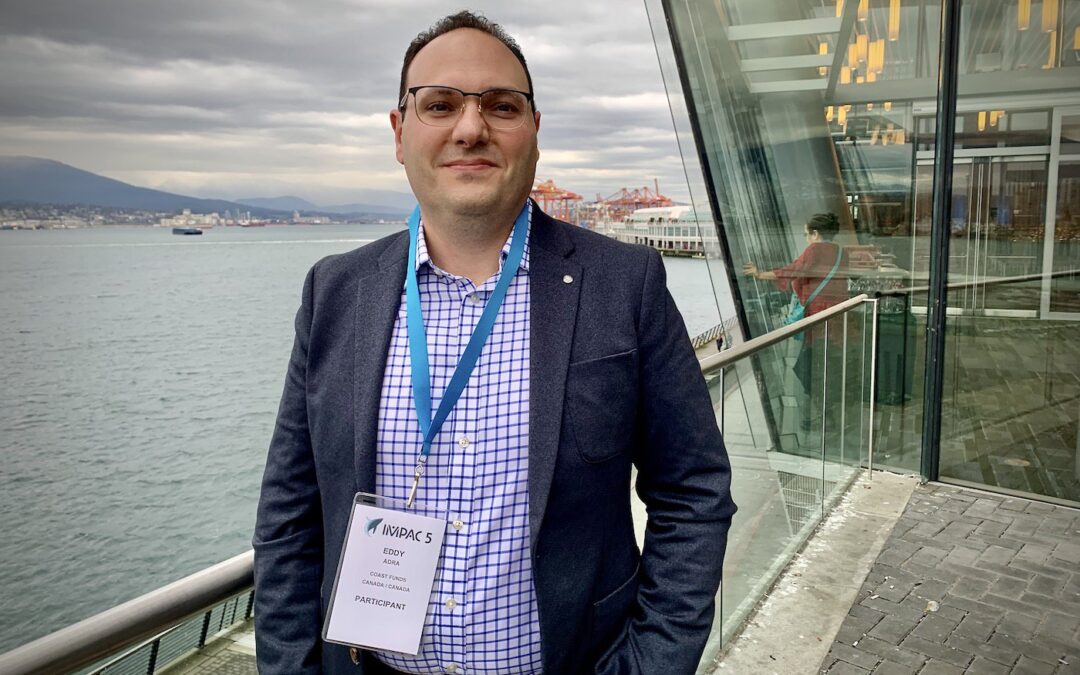Photo: Eddy Adra, CEO Coast Funds, notes the success of First Nations’ conservation economy — a “catalyst” driving regional and provincial growth — would be in peril from any oil spill / Rochelle Baker, Local Journalism Initiative Reporter, Canada’s National Observer
By Rochelle Baker
Local Journalism Initiative Reporter
Canada’s National Observer
If the oil tanker ban on the West Coast is lifted, nearly $2 billion in Indigenous-led economic gains could be scuttled, says a First Nations conservation finance organization.
A single oil spill doesn’t just threaten First Nations communities, but could sink BC’s entire economy — impacting tourism, commercial and recreational fisheries, aquaculture and marine services — all of which depend on the healthy, pristine coast, said Coast Funds CEO Eddy Adra.
Tourists and Alaska-bound cruise ships are drawn to BC’s natural beauty and the Great Bear region’s forests and seas, stewarded by First Nations for millennia, Adra said.
“People aren’t going to fly to Haida Gwaii, Bella Bella, Bella Coola or Prince Rupert to see black beaches covered in oil,” he said.
The province and coastal nations’ concerns about a reversal of the legislated oil tanker moratorium continues to swell as reports surface that the federal government is finalizing a deal with Alberta to push an oil pipeline to BC’s north coast.
An incident this week involving a heavily loaded cargo barge taking on water near Bella Bella reignited coastal First Nations fears about the economic and environmental dangers oil tankers pose on the coast.
A conservation economy
Nearly 30 First Nations who were partnered with Coast Funds leveraged the Great Bear region’s initial $60-million investment from the province and federal government and generated $1.8 billion in economic output in less than a decade, according to a recently commissioned independent report.
The 2007 Great Bear Forest initiative ultimately tripled its capital investment — drawing in $254 million in additional investments to fund sustainable enterprises such as ecotourism, shellfish aquaculture and processing facilities, along with other investments that buoyed household incomes by $331 million and the provincial GDP by $800 million, the report found.
The ripple effects of these economic successes is significant and the First Nations conservation economy has benefitted every community up and down the coast, many of which are pinched as more traditional industries contract, Adra said.
“The math is pretty clear as to how beneficial these investments are,” he said, noting the Indigenous-led conservation economy is a “catalyst” for regional growth.
“If you look at north Vancouver Island, you’ve got nations up there who are economic drivers that have diversified their economies, and the economies of their neighbours, so they aren’t just reliant on forestry and fisheries,” he added.
‘Fictitious’ project
BC Premier David Eby and coastal First Nations have joined forces to resist the pipeline proposal, recently signing a declaration calling on Prime Minister Mark Carney to honour the moratorium.
Eby has opposed the proposal, criticizing it as a “fictitious” project with no private sector backers that jeopardizes First Nations social licence for billions in “real projects” like LNG facilities dependent on their support to go ahead.
The premier also lambasted Smith, Sask. Premier Scott Moe and the federal government on Thursday for holding dialogues about the proposed project without BC being at the table.
But Eby softened his stance Friday, saying that “BC continues to be a team player” and is in conversation with the federal and Alberta governments.
While continuing to oppose a new pipeline to BC’s north coast, Eby said he’s open to expanding the already existing Trans Mountain Pipeline, owned by the federal government, “if needed.” However, he noted that the TMX pipeline, which BC also opposed, is not running at full capacity.
